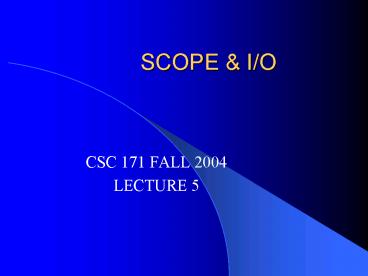SCOPE PowerPoint PPT Presentation
Title: SCOPE
1
SCOPE I/O
- CSC 171 FALL 2004
- LECTURE 5
2
CSC171
- Room Change
- Thursday, September 23.
- CSB 209
- THERE WILL BE A (group) QUIZ!
- - topic the CS department at UR
3
Scope and Accessibility
- Scope is the lifetime of a variable
- when where does it live
- Scope rules govern where in the program a
variable is accessible - Most times java provides explicit modifiers to
control scope - In two cases, scope rules govern accessibility
- class scope
- block scope
4
Class Scope
- Within a class definition reference variables of
this classs type can be used to access all
members regardless of their accessibility
modifiers
5
- Class Light
- private int noOfWatts
- private String location
- private boolean indicator // true or false
- public void switchOn() indicator true
- public void switchOff() indicator false
- public boolean isOn() return indicator
- public static Light duplicate (Light oldLight)
6
- public static Light duplicateLight (Light
oldLight) - Light newLight new Light()
- newLight.noOfWatts oldLight.noOfWatts
- newLight.indicator oldLight.indicator
- newLight.location
- new String(oldLight.location)
- return newLight
- // end of class
7
Class Scope
- Method duplicateLight has
- parameter oldLight
- local variable newLight
- Even though the instance variables of the class
are private, they are accessible though the
references
8
Block Scope
- Declarations and statements can be grouped into a
block using braces - The body of a method is a block
- Blocks can be nested
- General rule
- a variable declared in a block is in scope
inside the block in which it is declared but is
not accessible outside of the block
9
- public static void main(String args)
- //String args // cannot redeclare
- char digit
- int index 5
- int k 3
- int k 4 // ok
- // int index // not ok
- int index 6 // ok
10
Member Accessibility Modifiers
- Accessibility modifiers help a class define its
relationship to its client members - Accessibility of members can be one of
- public
- protected
- default (a.k.a package)
- private
-
11
public Members
- Least restrictive
- Accessible everywhere
- Both class (static) and instance members
12
protected Members
- Accessible in the package containing this class
- Accessible by all subclases of the class in any
package where this class is visible - Non-subclasses in other packages cannot access
protected members - Less restrictive than default accessibility
13
default Members
- When no access modifier is specified for a member
- It is only accessible by another class in the
same package where its class is defined - Even if a class is visible in another (possibly
nested) package, the member is not accessible.
14
private Members
- Most restrictive
- Private members are not accessible from any other
class. - This applies to subclasses
- Whether in the same package or not
- Not to be confused with inheritance
15
Other Modifiers for members
- static
- final
- abstract
- synchonized
- native
- transient
- volitile
16
static
- Members of the class in which they are declared
- Not part of any instance of the class
- The class need not be instantiated to reference
static members - Static members a.k.a class members
17
final
- A final variable is a constant
- Its value cannot be changed once initialized
- Applies to instance, static, and local vars
- Final methods cannot be overridden (redefined in
subclasses)
18
abstract (incomplete)
- An abstract method has the following syntax
- abstract ltreturn typegt ltnamegt (ltparamsgt)
- An abstract method does not have an
implementation (no method body) - Only a prototype is provided
- No instantiation is allowed
- Instantiable subclasses are forced to implement
the method body
19
advanced modifiers
- synchronized used for multi-threaded code
- native used for foreign (C,C) methods
- transient if you store it, you dont save the
values - volatile some other thread could change its
value
20
IO in JAVA
- If there is System.out
- There must be System.in
- And other methods
- Like pop ups
21
- import javax.swing.JOptionPane
- public class Popup
- public static void main(String args)
- String input1 JOptionPane.showInputDialog("Fi
rst number") - String input2 JOptionPane.showInputDialog("Se
cond number") - int i1 Integer.parseInt(input1)
- int i2 Integer.parseInt(input2)
- System.out.println(input1 " " input2 "
" - (input1 input2))
- JOptionPane.showMessageDialog(null,
- input1 " " input2 " " i1 i2)
- System.exit(0)
22
- import java.io.BufferedReader
- import java.io.InputStreamReader
- import java.io.IOException
- public class Console
- public static void main(String args) throws
IOException - InputStreamReader isreader new
InputStreamReader(System.in) - BufferedReader console new BufferedReader(isre
ader) - String input1 console.readLine()
- System.out.println(input1)

